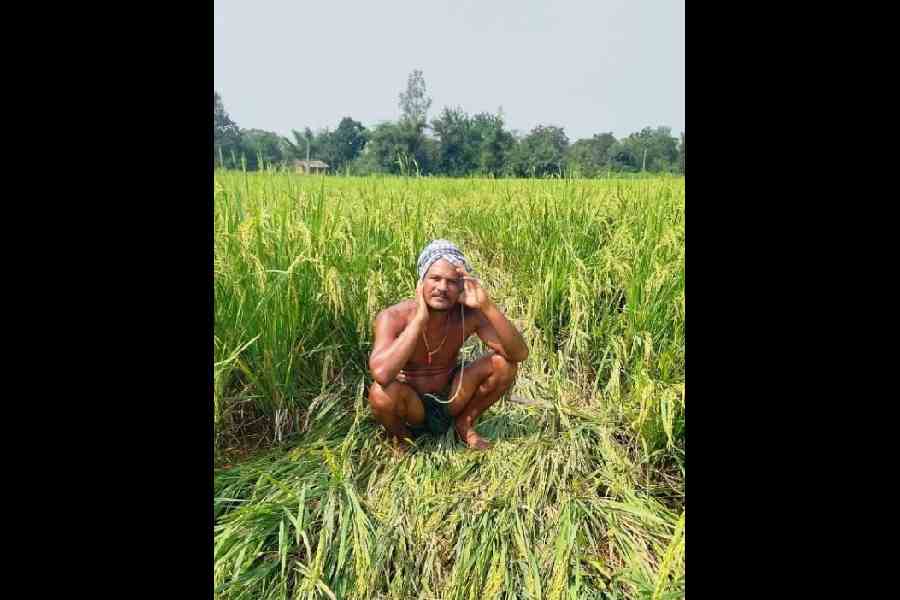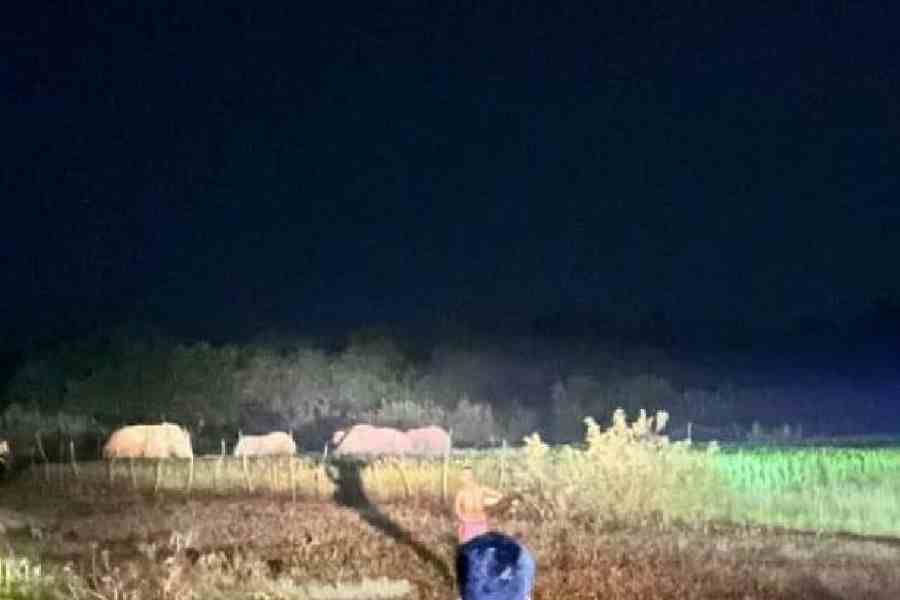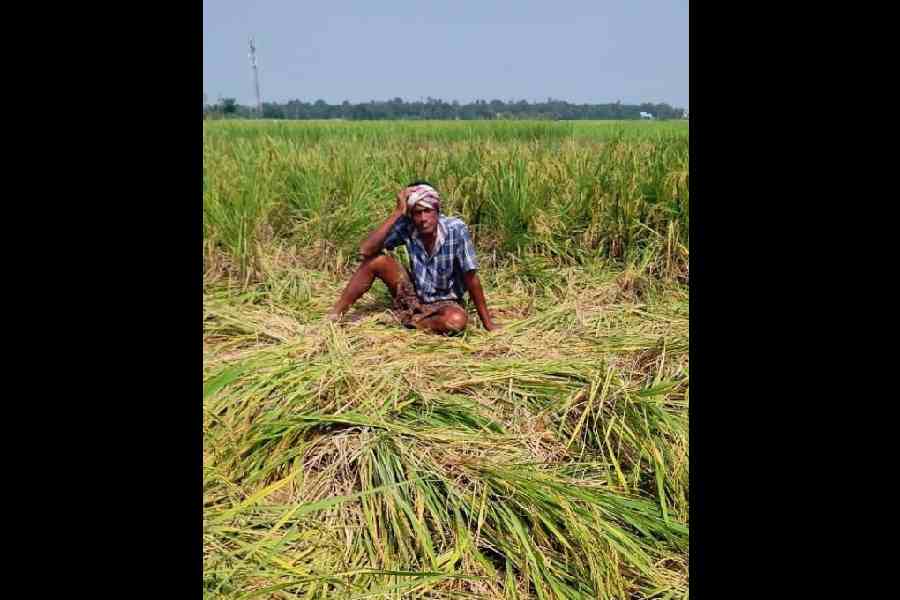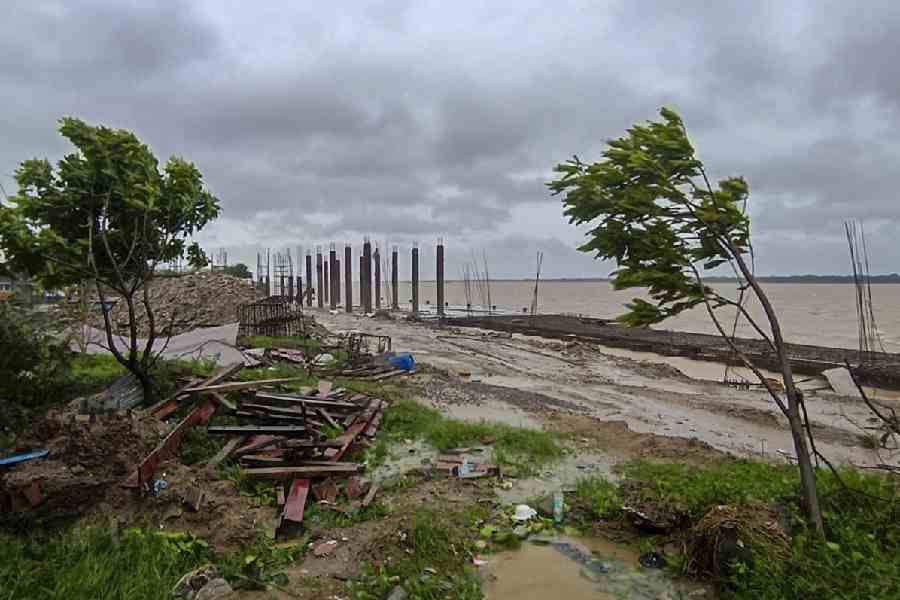The unseasonal rain triggered by Cyclone Dana destroyed half of Bharat Charan Chhotray’s paddy crop. Now a herd of elephants is threatening the other half.
"After Dana’s impact was over, we felt somewhat relieved, thinking our problem had ended," the 77-year-old farmer from Botalama village in Odisha’s Khurda district, about 65km from here, told The Telegraph.
"The rain had destroyed part of our standing paddy crop. But after we pumped the water out of the submerged fields, some of the paddy resumed growing. We planned to harvest it at the end of November. But now the elephants have come."
Gopalchandra Srichandan, 49, a resident of the same village, said: "I had grown paddy on three acres of land. The herd has destroyed one acre of paddy. We have so far managed to protect the rest thanks to round-the-clock vigil, but I don't know for how long."

Farmer Gopalchandra Srichandan in his paddy field that was destroyed by elephants
Srichandan said a group of local youths had formed a team to drive away the herd of 25-30 elephants by throwing burning tyres and crude bombs. But participating in such vigils can pose a "danger to one’s life, particularly at night", Srichandan said.
"As winter sets in, there is dense fog. Sometimes the elephants are invisible even from a few yards away despite our high-power torches," he said.
"This is what happened to two of our young men on Friday night. Thank God, it turned out to be a small elephant rather than a tusker. Otherwise, it could have trampled them to death."
Elephant depredations are an annual affair at Botalama, which is close to the Chandaka wildlife sanctuary, and nearby villages in the main paddy harvest season. The animals regularly take a toll on crops and lives in many other areas of Odisha too.
But this year, coming after Dana’s depredations, the villagers are feeling the pinch somewhat more.
"I had taken a loan of ₹50,000 to grow paddy this year. With so much of the crop lost, I don’t know what to do," Srichandan said.
He said the forest department gives just ₹20,000 per acre for crops destroyed by elephants, and the compensation process is cumbrous and lengthy. The money is inadequate, anyway, he added.
"One acre of land yields 20 to 25 quintals of rice. The MSP per quintal of rice is around ₹3,000. So we earn ₹60,000 to ₹75,000 per acre. You can easily imagine our losses," Srichandan said.

Farmers try to drive away elephants from the paddy fields.
Apart from Botalama, the herd is tormenting about 10 nearby villages including Chhatrapada, Hirapurgram, Manikpurpatna, Dova and Muktapur.
Srichandan and other farmers said the steps the forest department takes to drive the herds away are just eyewash.
"They simply flash a high-power torch, and the elephants go to the other side of the village or to the dense forests. Then they return to destroy our paddy fields again," said farmer Sarangadhar Samantasinghar, 62.

Farmer Sarangadhar Samantasinghar appear dejected following the destruction of his crop by elephants.
Calls and messages to the phone number of the Khurda divisional forest officer remained unanswered.
The state government said a central team would visit Odisha soon to assess the losses caused by Dana, which struck on October 24-25 night.
Revenue and disaster management minister Suresh Pujari said the central team would come after the state government sends a report to the Union government.
"But who will assess the damage done by the elephants?" asked farmer Prashant Jagdev, 52.











